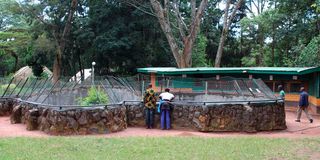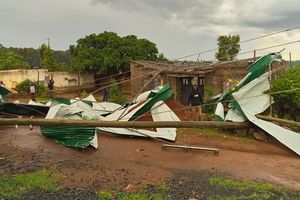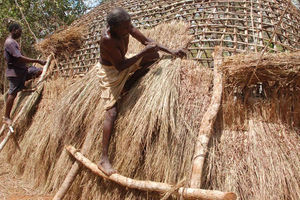Breaking News: Former Lugari MP Cyrus Jirongo dies in a road crash
Degraded historic Kitale museum gets new lease of life

A gallery at Kitale National Museum.
What you need to know:
- The museum, which is a haven of relics that are of great educational and touristic attraction, boasts of a nature trail and unique bird species on its indigenous forest cover.
The colonial Kitale National Museum is undergoing massive rehabilitation following wanton degradation of its forest cover and encroachment by private developers.
The national government has joined hands with Trans Nzoia County government and environmental partners to bring the museum back to life.
The museum, which is a haven of relics that are of great educational and touristic attraction, boasts of a nature trail and unique bird species on its indigenous forest cover.
A tree planting drive is on course in the forest belonging to the iconic museum.
The Kenya National Museums of Kenya handed over the museum to Trans Nzoia County government in February.
County Commissioner Gideon Oyagi has told those who have encroached on the land to vacateor be forcibly evicted to pave way for the rehabilitation of the facility.
He observed that the national government will support the county government to repossess grabbed land belonging to the museum to facilitate preservation of the heritage site for posterity.
“We want to make sure that all tourist attractions are protected for future generations,” noted Mr Oyagi.
The museum was originally founded in Cherangany Hills in 1894 by a former Second World War veteran and former settler High Stoneham. It was later moved to Kitale town. First opened to the public in 1924, the repository originally known as the Stoneham Museum is one of the biggest cultural heritage sites in the North Rift region.
Under the national government and the Trans Nzoia County government partnership, more than 20,000 indigenous tree seedlings were planted on part of the degraded nature trail last week.
Mr Oyagi and Deputy Governor Philomena Kapkory led a team from different government departments to plant the trees on the 30-acre piece of land targeted for rehabilitation.
The deputy governor observed that the county government has allocated funds for the rehabilitation programme, including the upgrade of amenities.
She raised concern over illegal logging and encroachment of the forest cover and called for concerted efforts to restore and protect it.
According to government records, Kitale Museum was allocated 82 acres of land, out of which 10 acres were leased to the VI Agroforestry organisation as an agricultural training and demonstration centre. However, massive encroachment by private developers has seen the museum lose part of its land.
“The museum has been under immense pressure from deforestation and encroachment. We want to bring it back to life and enhance its attraction,” noted Ms Kapkory.
She added that the devolved unit is profiling all tourist attraction sites to market them as centres of excellence and tourism destinations.
“We are also working to improve the branding and packaging of our facilities, including our colonial heritage homes. We are also calling on investors to help us improve our bed capacity to 5,000-bed capacity facilities,” she added.
The county government has also upgraded various facilities at the museum with an aim of improving service delivery to locals and visitors.
The facelift programme includes the rehabilitation of old dilapidated facilities and wildlife structures to boost the facility’s tourism potential and make it a centre of excellence for tourism promotion and cultural preservation.
“We appreciate the fact that we officially took over the management of this facility. We want to improve the face of these colonial buildings including the gallery, halls, snake pits, and other educational facilities,” noted Trans Nzoia Tourism, Sports and Gender Executive Stanley Kirui.





